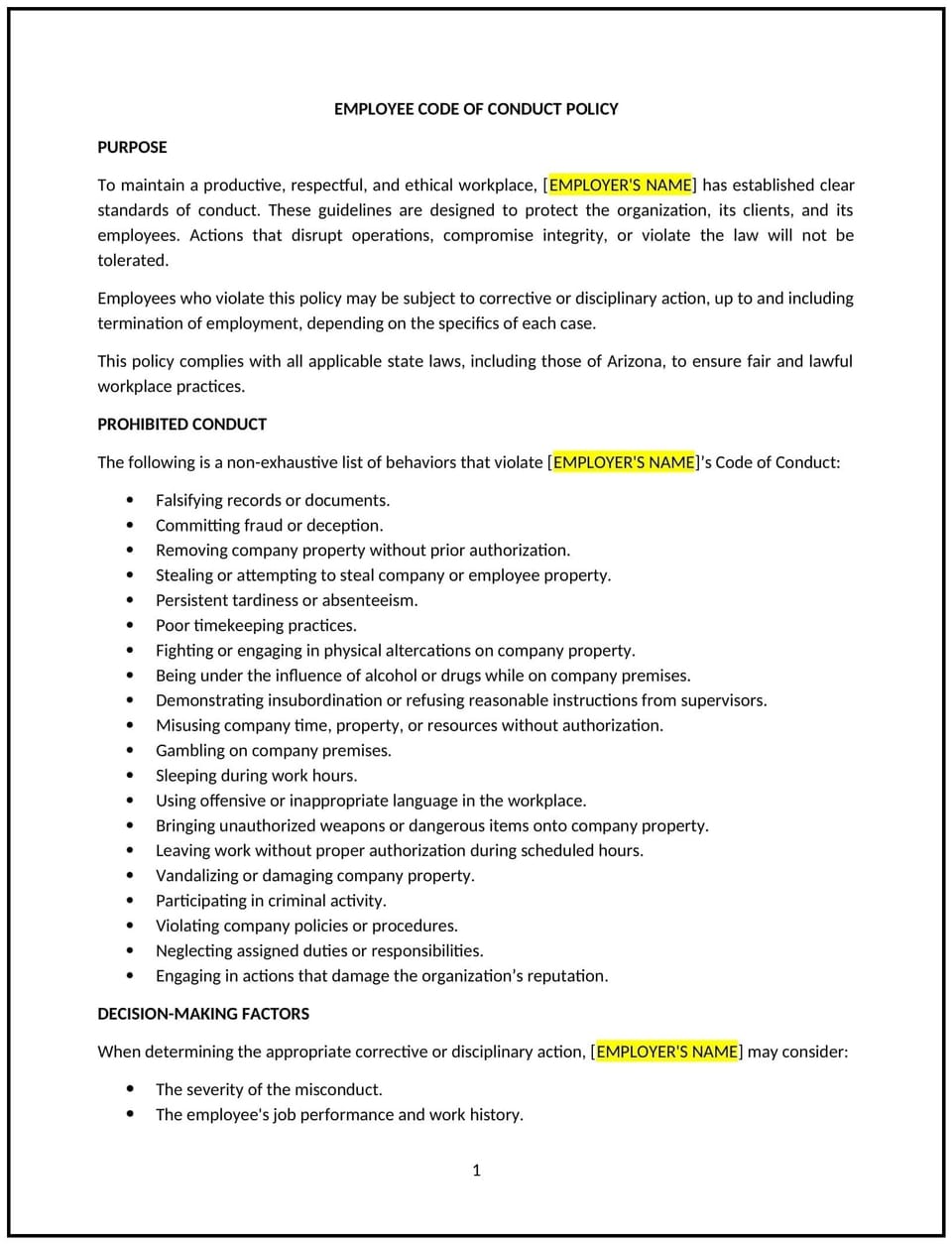Standards of conduct policy (Arizona): Free template

Standards of conduct policy (Arizona)
In Arizona, a standards of conduct policy outlines the expected behaviors, actions, and responsibilities for employees while at work. This policy ensures a respectful, safe, and professional environment, helping businesses maintain high standards of performance and compliance with state and federal laws.
This policy defines acceptable and unacceptable behaviors, establishes rules for workplace ethics, and provides guidance for resolving violations. By implementing this policy, Arizona businesses can foster a positive workplace culture, enhance productivity, and reduce the risk of conflicts or legal disputes.
How to use this standards of conduct policy (Arizona)
- Define expected behaviors: Specify the professional behaviors expected of employees, including punctuality, respect for others, honesty, and adherence to company policies.
- Address workplace conduct: Outline prohibited behaviors such as harassment, discrimination, violence, or substance abuse that violate company ethics and legal standards.
- Set performance expectations: Clearly communicate expectations for employee performance, including productivity, teamwork, and adherence to company procedures.
- Establish discipline procedures: Define the steps for handling violations, such as verbal warnings, written warnings, suspension, or termination.
- Encourage reporting: Provide a clear process for employees to report violations of the standards of conduct confidentially.
Benefits of using a standards of conduct policy (Arizona)
This policy offers several advantages for Arizona businesses:
- Promotes a positive work culture: By defining clear expectations, the policy helps create an environment of mutual respect, professionalism, and collaboration.
- Reduces conflicts: A clear standards of conduct policy helps prevent misunderstandings and disputes by providing guidelines for acceptable behavior.
- Supports compliance: The policy ensures adherence to state and federal laws, reducing the risk of legal violations or claims of discrimination.
- Increases productivity: Clear behavior and performance expectations help employees focus on their tasks, leading to a more efficient and effective workplace.
- Protects the business: The policy establishes a fair and transparent process for managing employee behavior, protecting the business from legal and reputational risks.
Tips for using this standards of conduct policy (Arizona)
- Address Arizona-specific considerations: Reflect local cultural norms, industry standards, and any specific Arizona labor laws when defining acceptable conduct.
- Provide training: Ensure employees understand the policy and how it applies to their roles by offering training on company expectations and conflict resolution.
- Use consistent enforcement: Apply the policy fairly and consistently to all employees to ensure equal treatment and avoid claims of favoritism or discrimination.
- Keep the policy updated: Review and update the policy regularly to reflect changes in business practices, legal requirements, or industry standards.
- Encourage feedback: Create an open channel for employees to ask questions, provide feedback, and seek clarification on the policy.
Q: What types of behavior are considered violations of this policy?
A: Violations may include harassment, discrimination, dishonesty, insubordination, violence, theft, or any behavior that disrupts the workplace or violates legal standards.
Q: How does the company handle violations of the standards of conduct?
A: Violations are handled through a progressive discipline process, starting with verbal warnings and potentially leading to written warnings, suspension, or termination depending on the severity of the violation.
Q: Can employees appeal disciplinary decisions?
A: Yes, employees can appeal disciplinary decisions through the grievance process, which allows for a fair review of the situation.
Q: How does this policy support compliance with Arizona laws?
A: The policy aligns with Arizona labor laws, including those governing harassment, discrimination, and workplace safety, ensuring that the company upholds its legal obligations.
Q: Can this policy change over time?
A: Yes, the company may update the policy to reflect changes in laws, company practices, or employee needs. Employees will be notified of any changes.
This article contains general legal information and does not contain legal advice. Cobrief is not a law firm or a substitute for an attorney or law firm. The law is complex and changes often. For legal advice, please ask a lawyer.


